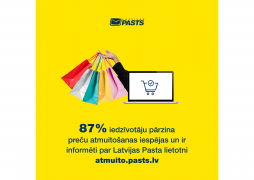
25.10.2021

The need to fill in a customs declaration and pay VAT on all postal items from third countries has affected the shopping habits of Latvian residents in international online stores. More than half (52%) of Latvians who have made purchases outside the European Union after the 1st of July 2021 admit that they shop in third countries less often or for smaller amounts, and another 5% have temporarily given up shopping outside the EU altogether, according to the poll conducted by Latvijas Pasts. At the same time residents who continue to shop have a good understanding of the possibilities of customs clearance of items and 87% are informed about the Latvijas Pasts application atmuito.pasts.lv.*
Overall, 35% of Latvian residents have made purchases via online platforms outside the EU over the last three months. On average, they were more often men and young people under 30 years of age. AliExpress is the most popular shopping platform outside the EU among Latvians: three quarters (75%) of those who shop outside the EU make their purchases there. Another 47% of residents have shopping experience on other platforms of third country commercial operators, including 18% opting for Ebay and 15% choosing Amazon.
“Even before the 1st of July the majority of items requiring customs clearance were from China – they accounted for up to 95% of the total number of items subject to customs clearance according to our estimates. With the entry into force of the new rules, the volume of items coming from China and other third countries has dropped, as we had already predicted in part, and the poll shows quite clearly the reasons for a temporary change in buyers’ habits. However, we strongly urge you not to be afraid and call on the customers who have stopped doing so to resume shopping in third-country online stores. The largest platforms have joined the European Union's special VAT scheme called IOSS or Import One Stop Shop, which allows you to pay VAT at the time of purchase. Regarding the customs clearance of such goods, customs formalities are completed by the commercial postal operator, and all the customer has to do is to collect their item,” Mārcis Vilcāns, Chairman of the Board of Latvijas Pasts, reports.
One of the reasons why consumers have opted out of shopping outside the EU since the change came into force is the reluctance to pay the extra amount of VAT when declaring the ordered goods to customs and a belief that the customs clearance procedure is too complicated. Overall, those who shop outside the EU are well aware of the need for customs clearance and VAT payment, with 93% aware of this before the start of the shopping process. At the same time only 71% of buyers know that VAT on goods purchased in third countries can also be paid during the shopping process, thus avoiding the need to fill in a customs declaration in Latvia.
However, even in cases when the item is subject to customs clearance or when the special IOSS scheme has not been applied to purchases, customs clearance via Latvijas Pasts is quick and easy.
“There are customers who are afraid of the new procedure and the process of customs clearance of goods, but both the State Revenue Service (SRS) and Latvijas Pasts are trying to simplify this procedure as much as possible. As before, a customer who receives an item requiring customs clearance can choose to perform customs clearance himself or herself in the SRS EDS system or delegate customs clearance of the item to Latvijas Pasts using the unique link for the specific item in the application atmuito.pasts.lv sent by Latvijas Pasts to the customer as a text message or as a QR code in a printed notification. It can be used in any smart device or computer and provides convenient and easy customs clearance and payment of taxes,” M. Vilcāns recalls.
One of the solutions for customs clearance of goods – the Latvijas Pasts application atmuito.pasts.lv or the SRS EDS – has so far been used by 51% of the residents who have shopped in online stores outside the EU after the 1st of July. According to buyers, the choice was more often made in favour of the Latvijas Pasts customs clearance tool (39%) and the SRS EDS website was used less often for submitting customs declarations (27%). 15% of buyers have tried both sites.
Overall, 87% of the residents who have shopped in online stores outside the EU over the last three months are informed about the goods clearance tool offered by Latvijas Pasts. 33% have used it once or twice, while 6% use it on a regular basis.
* The poll Shopping Outside the EU and Completion of Customs Declarations was commissioned by Latvijas Pasts and conducted in September 2021 by Snapshots, which surveyed 752 residents of Latvia aged 18–74.
About SJSC Latvijas Pasts
Latvijas Pasts ensures the widest availability of postal services throughout Latvia by maintaining more than 600 post offices. The primary function of the company is provision of the universal postal service; Latvijas Pasts also provides commercial transport, express mail, payment, press subscription, retail and philatelic services. Latvijas Pasts is a wholly State-owned company with about 3,200 employees. The quality measurements of Latvijas Pasts domestic mail deliveries are regularly conducted by Kantar TNS, one of the leading market, social and media research agencies in Latvia. In turn, the quality measurements of the cross-border deliveries are provided within the framework of the International Post Corporation through the intermediary of the research companies Kantar TNS, Ipsos and Quotas.
Additional information:
Gundega Vārpa | Head of External Communications
E-mail: pr@pasts.lv; gundega.varpa@pasts.lv
twitter.com/latvijas_pasts | facebook.com/latvijas.pasts | instagram.com/latvijas_pasts